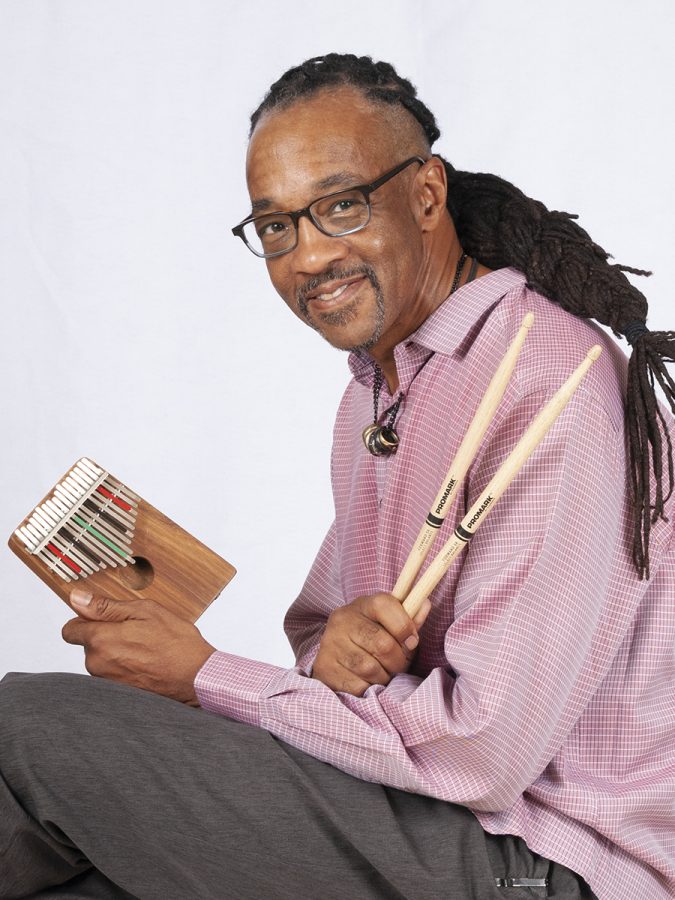Professor’s journey to jazz inspires next generation of musicians
Darryl Singleton provides representation, mentorship for music students
Darryl Singleton founded Crimson Ties WSU World Music Ensemble.
November 10, 2022
Music is a hobby for some, but for Darryl Singleton, it is his life.
“When you think about jazz, it’s more about the performer,” he said. “That resonates for me as a musician. Just the variance that you may play it one way today, and it will sound different tomorrow.”
As a jazz musician, percussionist and WSU instructor of Black American music and social justice/jazz percussion, Singleton impacts his students and audience with his music and energetic personality. He has also witnessed excellent jazz musicians at work, he said.
At Howard University, he attended clinics led by Billy Taylor, Betty Carter, Dizzy Gillespie and more. These experiences have helped him perfect his craft as a musician and given him the skills to continue his musical journey, he said.
Singleton grew up in Washington D.C., where his exposure to jazz began. He did not understand jazz, which was popular at the time, but he grew to appreciate it, he said.
His father loved big band and 60s jazz, and he played his records around the house, he said. Singleton’s mother was into funkier jazz, like Ramsey Lewis.
Singleton said his favorite memory of jazz is attending jazz concerts in the park. During his childhood, government-funded arts, like the Smithsonian Institution, or summer concerts were at no cost to the public. There was a summer concert series Singleton attended, where he saw Lewis and military jazz bands, like the Navy Commodores.
“I grew up seeing some of the best of the best as far as that’s concerned,” Singleton said. “All those exposures I had, those concerts, were meaningful to me as far as jazz was concerned.”
At WSU, he teaches jazz and percussion, and he also founded the Crimson Ties WSU World Music Ensemble, he said.
Rogan Tinsley, junior music composition major, plays with Singleton in the World Music Ensemble. The ensemble rehearses in class and performs at live jam sessions every Thursday. Singleton’s teaching style, energy and down-to-earth personality have impacted Tinsley, he said.
“Watching Doc D. give instructions to people in bands and ensembles has influenced me a lot,” Tinsley said. “He can articulate his thinking with the least number of words possible, which is such a skill running an ensemble.”
Singleton has also impacted other students in the World Music Ensemble. Senior psychology major Dominiqué Smith-Pierre performs on and off-campus with Singleton, she said.
She said she sees herself represented in Singleton, as she has never performed with a person of color and feels Singleton understands her.
“He has a better understanding of where I’m coming from with some of the things I might be struggling with, or just my overall personality, which is very neurotic,” Smith-Pierre said. “He works to get down to my level and gives me so much of his experience. He is more of a mentor to me than an instructor.”
Singleton impacts all his students, whether in a group or one-on-one setting. Joe-Henry McQuary, sophomore jazz drumming and performance major, takes private lessons with Singleton. McQuary said Singleton uses an open teaching style to make sure students are heard, taking their interest in something and magnifying it.
“He’s a great teacher [that] makes sure you are heard,” McQuary said. “There’s an expectation of quality, but he takes your interest in something and magnifies it by looking deeper into whatever it is you are interested in.”
Singleton said he is a product of many Historically Black Colleges and Universities, or HBCUs. He started his teaching career at the University of the District of Columbia, then taught at Grambling State University and Texas Southern University. He is proud of those affiliations and said they helped him prepare for success as a musician.
His musical journey does not end with jazz. He was also exposed to percussion when he was 6 years old. His sister was performing a piano piece for her lessons and needed accompaniment. Singleton accompanied his sister on the bongos and enjoyed playing the instrument.
Later, Singleton joined a subsidized program in Washington D.C. called the DC Youth Orchestra Program. The program would start with the beginning/elementary ensemble, and musicians would work their way up to more advanced ensembles.
“Going into the early 80s, 25% of all African American symphony musicians in the country came out of that program,” Singleton said. “There weren’t a lot of African American symphony musicians. … It is a good program, better than most school programs.”
Music is his job and something he gets to do every day. It is his passion and something he enjoys sharing with his students, WSU, the Pullman community and the world, Singleton said.
“I work in music, and then I get to play music,” Singleton said. “Music is a huge part of my life; it has an impact I cannot even describe. I have had the opportunity to see performers and play with people, and things like that are amazing just because of music.”








